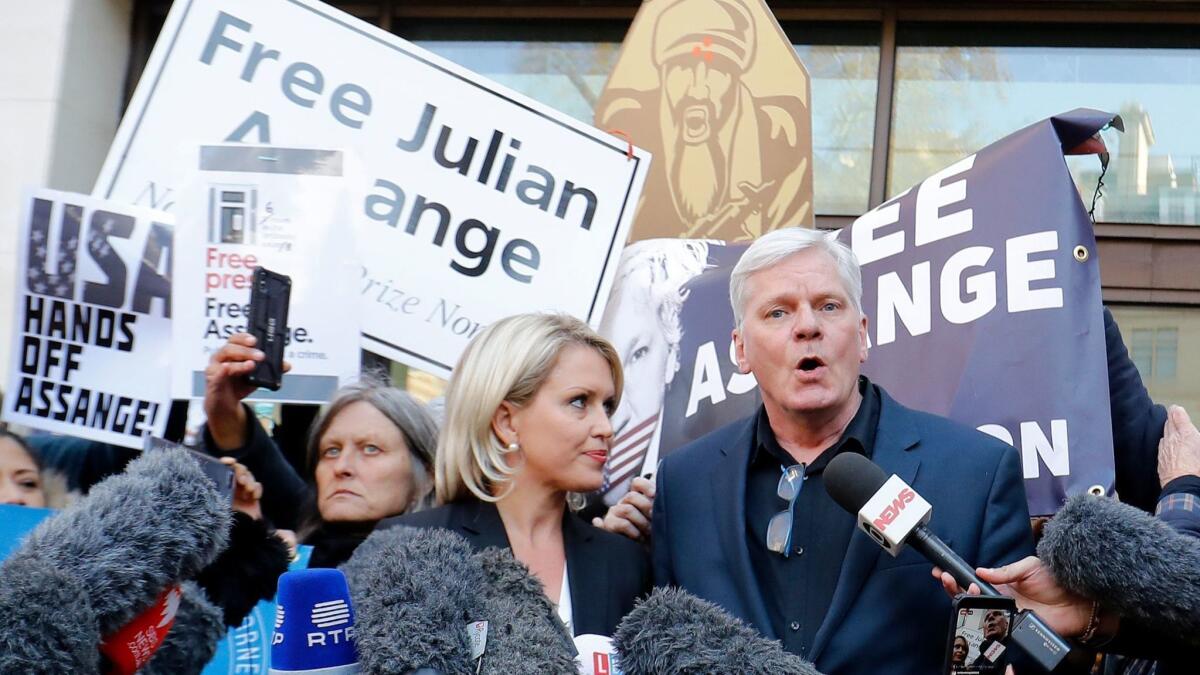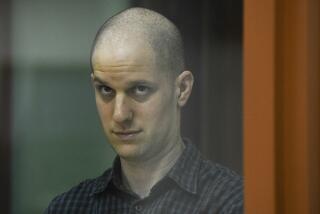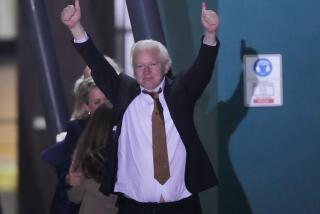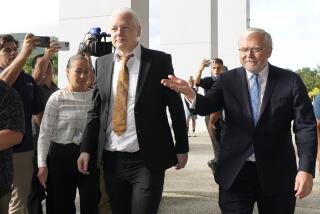WikiLeaks’ Julian Assange faces U.S. hacking charge after dramatic arrest in London

Julian Assange faces U.S. computer-hacking charge after arrest in London.
- Share via
Reporting from Washington — WikiLeaks founder Julian Assange was arrested at Ecuador’s embassy in London early Thursday at the request of the United States, and the Justice Department later said he had been indicted in connection with a computer hacking conspiracy, a dramatic development in the nearly decade-long global saga.
Prosecutors accused Assange of conspiring with Chelsea Manning, a U.S. Army intelligence analyst in Iraq in 2010, to crack a Defense Department computer password for accessing a vast trove of classified U.S. military and diplomatic material that subsequently was disclosed through WikiLeaks.
It was one of the largest unauthorized releases of classified materials in U.S. history, involving some 250,000 State Department cables, 400,000 reports from the Iraq war and an additional 90,000 reports involving fighting in Afghanistan, according to the indictment.
If convicted of conspiracy to commit computer intrusion, Assange, 47, could face five years in prison. It wasn’t clear if he would face additional U.S. charges now that he was in custody.
The Australian-born Assange is a deeply polarizing figure, and his case reflects a collision of critical issues in the internet age.
His supporters hail his pioneering role in exposing what they consider official wrongdoing, and argue that WikiLeaks functions as a digital publishing platform that deserves the same legal protections as any other journalism organization.
National security experts see Assange as a direct threat as governmental institutions scramble to protect what they consider legitimate secrets. Two years ago, then-CIA Director Michael R. Pompeo described WikiLeaks as a “nonstate hostile intelligence service.”
The seven-page indictment does not cite WikiLeaks’ role in the release of thousands of hacked Democratic Party emails during the 2016 election, a focus of the special counsel investigation led by Robert S. Mueller III. Mueller said Russian operatives provided the stolen material to WikiLeaks.
DonaldTrump repeatedly praised WikiLeaks in 2016 while it was undermining Hillary Clinton, his Democratic opponent, but the president distanced himself from Assange’s organization on Thursday when reporters asked him for comment at the White House.
“I know nothing about WikiLeaks,” he said. “It’s not my thing.”
The indictment alleges a conspiracy with Manning to make it more difficult for authorities to track the source of the leaked information. It said Manning was attempting to use someone else’s credentials to log into a classified computer network and provided a portion of the password to Assange for him to decode.
Assange apparently could not crack the password, however, telling Manning he had “no luck so far,” the indictment said.
Assange long has been a target of federal investigators, but President Obama’s administration was concerned that charging him could damage 1st Amendment protections on which journalists rely to publish classified government documents.
“That is where every conversation led,” according to a person familiar with the debates.
Trump administration officials and career prosecutors, however, decided to push forward in a way they thought could skirt such weighty issues.
They decided to pull on a thread that had already been uncovered, according to another person familiar with the investigation — specifically, that Assange allegedly tried to help Manning access the Defense Department computer network by cracking someone else’s password.
A case involving computer hacking appeared to be the most straightforward one to make, according to people with knowledge of how the indictment was put together.
All of the sources refused to speak publicly about internal Justice Department discussions.
The indictment does not charge Assange in connection with publishing government secrets, and legal experts said that could allow prosecutors to sidestep fraught legal issues involving the 1st Amendment.
“For me, the key is that this isn’t about the Espionage Act or the publication of classified national security information,” University of Texas law professor Stephen Vladeck wrote on Twitter. “It’s not a direct threat to the press.”
Paul Rosenzweig, a cybercrime expert and former Homeland Security official, said the charge against Assange was related to a 1986 law called the Computer Fraud and Abuse Act.
“Journalists are not at risk from this prosecution as currently framed,” he said.
But Barry J. Pollack, a Washington-based lawyer for Assange, said U.S. journalists should still feel threatened by the prosecution of the WikiLeaks founder.
“While the indictment against Julian Assange disclosed today charges a conspiracy to commit computer crimes, the factual allegations against Mr. Assange boil down to encouraging a source to provide him information and taking efforts to protect the identity of that source,” Pollack said in a statement.
The indictment unsealed Thursday was dated March 6, 2018, a sign that the Justice Department had prepared the move for more than a year. In November, federal prosecutors accidentally revealed the existence of the indictment — but not the specific charge — in a court filing in an unrelated case.
The prosecution of Assange is being handled by the U.S. attorney’s office in the Eastern District of Virginia. Assange plans to fight extradition, which could turn the process into a lengthy legal battle, so it’s not clear when he is likely to appear in a U.S. court.
After booking at a central London police station, Assange was brought to Westminster Magistrates’ Court, where he waved to supporters in the public gallery and gave a thumbs-up.
Judge Michael Snow found Assange guilty of violating a bail agreement in an earlier case, and he faces up to a year in jail there in addition to the U.S. charges.
Snow said Assange showed “the behavior of a narcissist who cannot get beyond his own selfish interest,” and he ordered him to appear in court via a video link on May 2 as part of the extradition process.
His lawyer in London, Jennifer Robinson, argued that the prosecution posed a threat to British journalists.
“This precedent means that any journalist can be extradited for prosecution in the United States for having published truthful information about the United States,” she told reporters outside the court.
She said she had just visited Assange in jail and that he seemed unsurprised by his arrest, telling her, “I told you so.”
Manning is in U.S. custody after a federal judge in Alexandria, Va., found her in contempt and ordered her to jail last month for refusing to testify before a grand jury, reportedly in connection with the case against Assange.
In 2013, a military judge sentenced Manning to 35 years in a maximum security prison for her role in leaking the trove of classified materials in 2010. President Obama commuted her sentence before he left office, and ultimately Manning served seven years dating from her initial arrest.
Assange sought refuge in the Ecuadorean Embassy in 2012 after he was released on bail while facing extradition to Sweden on sexual assault allegations. Those charges eventually were dropped, but he also faced arrest by British authorities for jumping bail in the case.
He stayed in the embassy for nearly seven years, an increasingly unwelcome guest. He met supporters, issued statements and continued his work with WikiLeaks. Ecuador made clear it was looking to get rid of Assange and last summer began talks with British authorities about handing him over.

His lengthy stay abruptly came to an end about 10:15 a.m. Thursday when six officers from the London Metropolitan Police were allowed into the embassy and then hauled Assange out the front door.
Ruptly, a news service of Russia Today, captured video of Assange being removed from the building. He wore a full beard and gray hair pulled back in a bun, and he appeared to argue with police as they bundled him into the police van. “This is unlawful,” he reportedly shouted. “I am not leaving.”
In a statement, the British police said Assange was arrested “for failing to surrender to the court and following a U.S. extradition request.”
In what appeared to be a carefully choreographed set of events, Ecuadorean President Lenin Moreno tweeted a statement and video soon after the arrest. He said his government had withdrawn Assange’s asylum status in a “sovereign decision” after repeated violations of “international conventions and daily-life protocols.”
“We’ve ended the asylum of a spoiled brat,” Moreno said later in Ecuador. “We’ve gotten rid of a pebble in our shoe. From now on, we’ll be more careful to give asylum to people who are really worth it, and not miserable hackers whose only goal is to destabilize governments.”
British Foreign Secretary Jeremy Hunt thanked Ecuador for its assistance.
“Julian Assange is no hero and no one is above the law. He has hidden from the truth for years,” he tweeted.
WikiLeaks harshly criticized Assange’s arrest.
“Powerful actors, including CIA, are engaged in a sophisticated effort to dehumanise, delegitimize and imprison him,” the organization tweeted.
The Kremlin also expressed concern for Assange.
Russian Foreign Ministry spokeswoman Maria Zakharova, writing on her Facebook page, said his arrest showed that “the hand of ‘democracy’ squeezes the throat of freedom.”
Megerian and Wilber reported from Washington and special correspondent Boyle from London. Times staff writers David G. Savage and Tracy Wilkinson in Washington and special correspondent Sabra Ayres in Moscow contributed to this report.
More to Read
Sign up for Essential California
The most important California stories and recommendations in your inbox every morning.
You may occasionally receive promotional content from the Los Angeles Times.












